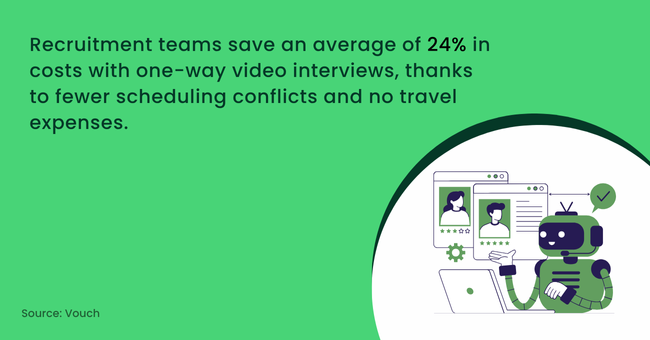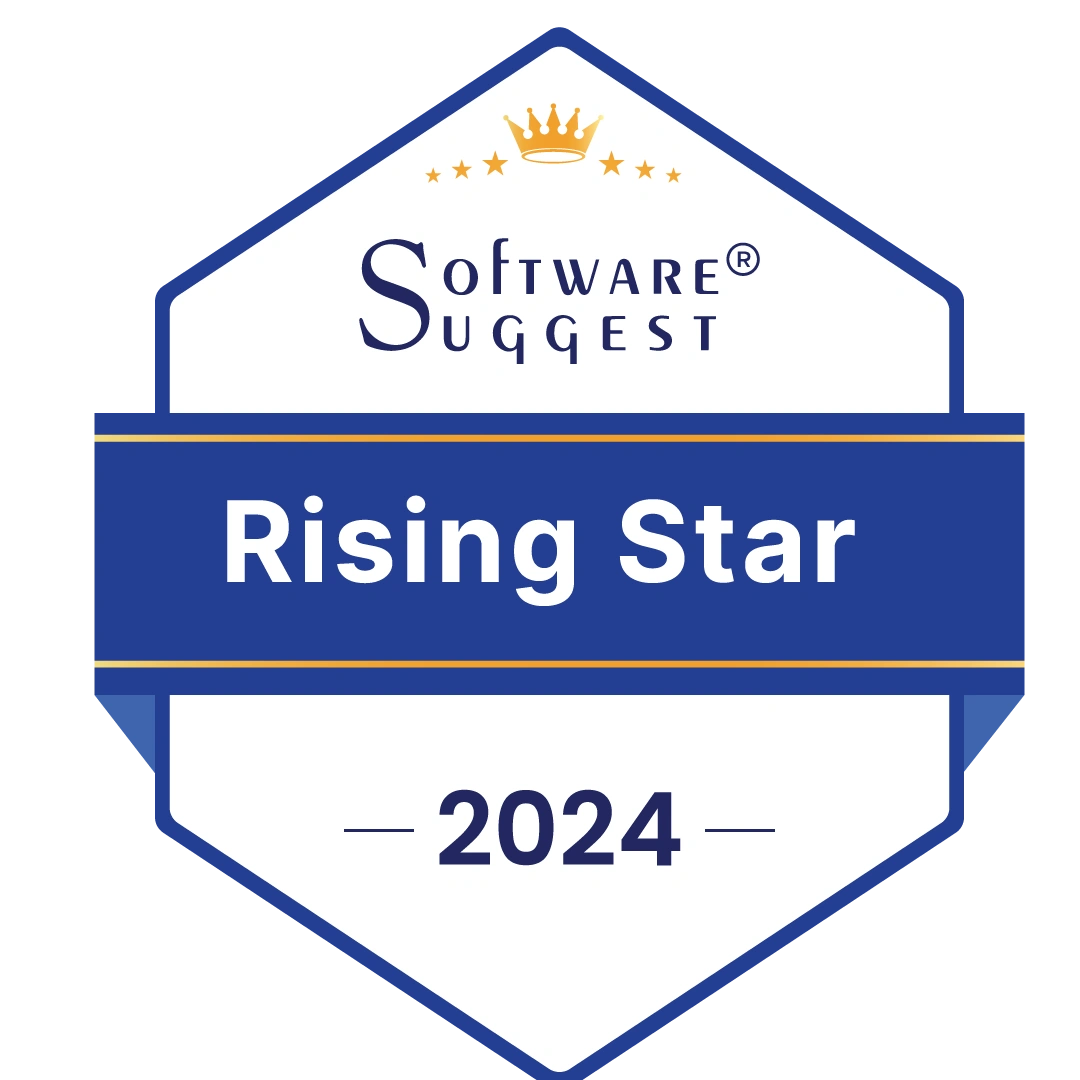
AI in One-Way Video Interviews: What Works vs What's Hype
Oct 14, 2025 |
TL;DR
- AI in one-way video interviews is growing rapidly, offering efficiency, scalability, and structured insights for recruiters.
- While AI recruitment tools can enhance hiring processes, human oversight remains crucial. AI should support, not replace, human judgment in recruitment technology.
- Platforms like ScreeningHive show that one-way video interviews can be highly effective without AI, focusing on features like customizable templates, collaboration tools, and secure, candidate-friendly processes.
- Choosing the right platform matters more than AI, focus on usability, security, candidate experience, and structured evaluation.
- Future AI trends in recruitment include multimodal analysis, bias detection, and explainable AI, enhancing human-led recruitment rather than replacing it.
- Bottom line: AI-powered hiring tools are promising, but fair, efficient, and candidate-centric hiring can already be achieved with structured, secure, and collaborative video interview platforms.
Introduction
AI-powered hiring tools in one-way video interviews are creating quite a buzz in the recruitment world. Recruiters are excited about tools that can automatically screen candidates, analyze responses, and even provide insights into candidate suitability. While AI in recruitment can be effective, human-led recruitment remains essential for fair and context-aware decision-making.
That said, one-way video interviews have proven to be highly effective even without AI. These interviews allow recruiters to review candidates at their convenience, ensure fairness, and maintain consistency through structured interview processes, all while keeping the candidate experience at the forefront.
What AI Brings to One-Way Video Interviews (The “Works”)
AI in one-way video interviews can provide some clear advantages, particularly in managing large applicant pools:
- Efficiency & Scalability: For roles with hundreds of applicants, AI screening tools can quickly transcribe candidate answers and summarize key points, helping recruiters focus on the most relevant candidates first.
- Consistency & Insights: AI-powered recruitment tools can highlight important keywords, organize responses, and provide structured data for easier comparison. For example, it can flag technical skills or identify recurring themes across multiple interviews. However, human oversight is essential to ensure these insights align with the role’s specific requirements.
- Accessibility: One-way video interviews allow candidates to record interviews at their convenience. This flexibility can help attract talent across different time zones, creating a more inclusive recruitment process.
Even without AI, ScreeningHive already delivers these benefits. Features like bulk candidate invitations, calendar syncing, mobile-friendly interfaces, and practice interviews make hiring smooth and stress-free for both recruiters and candidates.
According to Vouch, recruitment teams save an average of 24% in costs with one-way video interviews, thanks to fewer scheduling conflicts and no travel expenses.

What’s Mostly Hype and Where to Be Cautious
Not all AI recruitment tools deliver on their promises. Several areas require careful consideration:
- Emotion and Personality Analysis: Some tools claim to analyze facial expressions or tone of voice to gauge personality traits. However, these insights can be inconsistent, making them a tool for support rather than a replacement for human judgment.
- Automated Scoring: AI screening tools may offer quick scoring summaries, but human-led recruitment remains essential. Scores alone cannot capture the context, nuance, or cultural differences that a recruiter must consider.
- Bias and Fairness: AI is sometimes marketed as “bias-free,” but if models are trained on historical data, they may perpetuate existing biases. Ethical AI in recruitment must include human review to ensure fairness.
- Candidate Experience and Privacy: AI assessments can feel impersonal or confusing to candidates. Maintaining trust requires clear instructions, practice sessions, and secure, encrypted recordings.
Key takeaway: AI is promising, but ScreeningHive’s structured, secure, collaborative, and bias-free platform already ensures fair, reliable, and efficient hiring today.
Human-Led Hiring Enhanced by Technology
AI works best as an assistive tool, complementing rather than replacing recruiters. Human judgement, combined with smart tools, ensures the recruitment process remains fair, consistent, and effective.
Consider how ScreeningHive supports human-led hiring:
- Structured Questions and Customisable Templates: Recruiters can tailor questions to each role, set mandatory or optional indicators, and ensure that evaluations are consistent across candidates.
- Collaboration Tools: Multiple hiring managers can review candidate responses, discuss performance, and make joint decisions, ensuring that no single perspective dominates the evaluation process.
- Video Sharing and Feedback Management: Teams can easily share interview recordings, leave structured feedback, and track ratings over time, providing a clear audit trail for decisions.
- Candidate-Centric Features: Practice interviews, clear instructions, and a mobile-friendly interface ensure candidates feel comfortable, leading to more authentic responses.
These features show that effective hiring doesn’t require AI. Technology should enhance the process, but human insight remains at the core.
Selecting the Best One-Way Video Interview Platform
What Actually Matters:
- User-Friendly Interface: Easy-to-use, mobile-friendly, and works across devices.
- Customisable Question Templates: Tailored to job roles, with mandatory or optional indicators.
- Candidate Experience: Practice sessions, clear instructions, and secure, encrypted recordings keep candidates confident and engaged.
- Collaboration Tools: Video sharing, joint decision-making, and feedback management ensure thoughtful hiring decisions.
- Integration & Notifications: ATS integrations, calendar syncing, automated emails, and completion alerts streamline workflow.
Warning Signs of Poor Platforms:
- No flexibility in question types or templates.
- Confusing instructions or a lack of practice interviews.
- Limited collaboration or feedback options.
- Weak security or unclear data handling.
- Minimal support for recruiters or candidates.
When choosing a platform, features, security, and candidate experience matter far more than AI claims. A strong core platform delivers results regardless of AI.
What’s Next for AI in One-Way Video Interviews?
AI in recruitment is evolving quickly, and one-way video interviews are part of this transformation. The future points towards smarter, more transparent, and fairer AI tools.
- Multimodal AI: New systems will analyse text, audio, and video together, offering richer insights into communication and reasoning skills, though human interpretation will still be essential.
- Bias Detection and Explainable AI: Future tools will focus on identifying bias and explaining how scoring decisions are made, helping recruiters trust the process.
- Ethical and Regulatory Compliance: With GDPR and AI regulations, ethical use and candidate privacy will take centre stage.
- Practical Integration: AI will continue to complement human-led hiring, automating repetitive tasks like transcription or summarisation while recruiters focus on understanding context and fit.
While AI can complement the recruitment process, platforms with structured, secure, and candidate-friendly features will continue to perform effectively. Responsible AI adoption should enhance efficiency without replacing human insight.
Conclusion
AI-powered hiring tools in one-way video interviews are undeniably exciting, but the human element remains central to fair, accurate, and context-aware hiring. While AI video interview scoring and insights can streamline processes, structured interview processes and human judgment continue to be essential for making well-rounded hiring decisions. Platforms like ScreeningHive show that one-way video interviews can be secure, collaborative, customizable, and bias-free, all without relying on AI.
Frequently Asked Questions (FAQs)
1. Do all one-way video interviews use AI?
No, not all one-way video interviews use AI. While some platforms leverage AI in recruitment to analyze responses or detect patterns, many recruiters prefer human-led evaluations to ensure consistent and unbiased assessments. AI recruitment tools can be useful, but human judgment is often relied upon for a more thorough and ethical evaluation process.
2. How do one-way video interviews help recruiters?
One-way video interviews save recruiters valuable time by eliminating scheduling conflicts and allowing them to review candidate responses at their convenience. This method aligns with recruitment technology trends by offering a consistent, streamlined process. It also facilitates automated candidate screening, enabling recruiters to assess candidates efficiently while ensuring fair evaluations across the board.
3. How do one-way video interviews improve the candidate experience?
One-way video interviews provide candidates with flexibility, allowing them to record responses at their convenience. This reduces the stress of real-time interactions while giving candidates the chance to express themselves thoughtfully. Unlike AI video interview scoring, which might evaluate responses mechanically, human review ensures that candidates' answers are assessed fairly and comprehensively.
4. What are the key challenges of using one-way video interviews in recruitment?
While one-way video interviews can reduce scheduling conflicts and improve efficiency, there are challenges to consider. A major concern is the lack of interaction, which may lead to misinterpretation of responses. Additionally, AI screening tools can sometimes miss critical nuances in a candidate’s communication, and human judgment remains essential to overcome these limitations in the recruitment process.
5. How can one-way video interviews help reduce bias in recruitment?
One-way video interviews can help reduce bias in recruitment by standardizing the interview process. Every candidate answers the same set of questions, ensuring a fair evaluation based on consistent criteria. While ethical AI in recruitment can assist in removing some bias, it's important to note that human judgment still plays a key role in preventing unconscious bias and ensuring fair hiring decisions.













